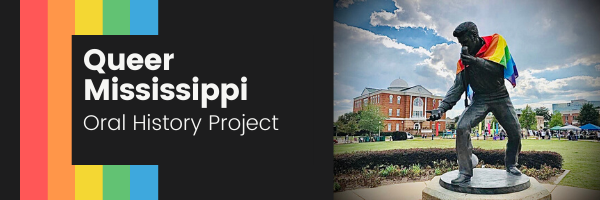
Queer Mississippi (Complete Collection)
Document Type
Audio
Loading...
Publication Date
3-9-2018
City
Water Valley (Miss.)
Abstract
Jaime Harker is a professor of English and Gender Studies at the University of Mississippi, the owner and Board President of Violet Valley Bookstore in Water Valley, MS, and the Director of the Sarah Isom Center for Women’s and Gender Studies. In this interview, Jaime talks about her childhood growing up in Seattle, WA as the child of two immigrants from Canada and the youngest of four siblings. The family’s Mormonism played a significant role in shaping her childhood. Jaime shares that she challenged faith teachings and “was always a feminist.” She spent a year abroad on a Mormon mission in Sendai, Japan after her college graduation. Jaime discusses the rigorous demands of this missionary work, the challenges presented by communicating across language barriers, and the patriarchal hierarchy she observed in this environment. Jaime talks about how she fell in love with a Japanese woman abroad and her choice to talk to an ecclesiastical leader about their relationship. Jaime then shifts back in time to her elementary and middle school experiences as Seattle bused students (including herself) as part of the desegregation effort. She talks about her family’s move to Del Mar, California just before Jaime began high school. Jaime ended up attending Brigham Young University for college and talks about the marriage-oriented culture that she encountered there. She returned to BYU after her mission in Japan for a Master’s program. As a graduate student, Jaime became involved in activist efforts on campus. When the university refused to allow feminist professor Cecilia Konchar Farr to teach a feminist theory course, students (including Jaime) started an informal book group at Farr’s house, which they dubbed “Feminist Home Evening” (a play on the Mormon tradition of “Family Home Evening”). Jaime discusses her other activist efforts: petitioning for a campus women’s center; participating in the feminist student organization, VOICE; and helping to organize protests against the university’s decision to fire Farr. Deciding to go on to get her PhD at Temple University in Philadelphia, Jaime talks about that transition as well as her gradual decision to stop practicing Mormonism. She says she met a girl through one of her classes and they began dating. Jaime says she moved to Pittsburgh to live with her after completing her classes. After a period of job-hunting while working in the non-profit sector, Jaime says she came across a job posting for a role at the University of Mississippi and applied. Despite the fact that her then-partner did not want to live in the South, Jaime says she accepted the position because “it just felt right.” She talks about how the queer South was always fascinating to her and John Howard’s Men Like That opened her eyes to a new way of understanding Mississippi. As a transplant to Mississippi, Jaime says she discovered a community of Oxford lesbians through a mutual connection. She reflects, “I think that’s what can be difficult about queer life if you’re not from here is that you don’t have that web of networks.” Jaime closes the interview with what she has learned about navigating university systems, the importance of building relationships, and the possibilities and pitfalls of student activism for inciting change on college campuses. This interview was conducted as part of a class taught by Jessie Wilkerson (SST 560: Oral History & Documenting LGBTQ Histories in Mississippi) at the University of Mississippi in the spring semester of 2018.
Relational Format
audio recording
Extent
0:30:57
Rights
In copyright. For permission to duplicate, repost, or otherwise re-use this recording, please contact the Invisible Histories Project.
Recommended Citation
Harker, Jaime and Barrett, Frankie, "Harker, Jaime (part 2 of 2)" (2018). Queer Mississippi (Complete Collection). 41.
https://egrove.olemiss.edu/queerms/41
Abstract
Harker, Jaime_Photo.JPG (1515 kB)
Photo of Jaime Harker
Harker, Jaime_Tape Log.docx (15 kB)
Tape Log


Comments
Additional files include: abstract, field notes, audio file. Transcript is available on request.